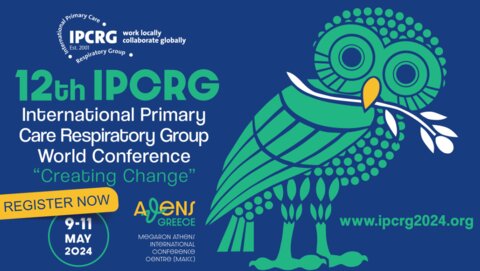Athens 2024: leadership development opportunities and spotlighting our breathlessness sessions
Leadership development at the 12th IPCRG World Conference

IPCRG believes that to achieve our vision of a global population breathing and feeling well through universal access to right care we need to invest in respiratory leaders. As part of our commitment, we have designed a leadership track including several workshops and a kick-off and closing leadership event at our World Conference in Athens (all timings local Greek time):
- Thursday 9th May 9-12 (timing to be confirmed): Kick-off leadership event 'Knowing Me, Knowing You' - a session before the main conference starts to get to know each other, explore the importance of self awareness as a leader and the value of knowing yourself and your team to make the best use of all your strengths for better collaboration and conversation. Co-led by Drs Katherine Hickman and Maisun Elftise.
Optional skills workshops we recommend (alternatively, you are also free to go other concurrent sessions eg on Asthma Right Care, planetary health, children's health):
- Thursday 9th May 14.10-15.55: Motivational communication led by Prof Kim Lavoie
- Thursday 9th May 15.55-17.10: Building an inter-disciplinary team. Co-Led by Habib Ghedira, Darush Attar-Zadeh, María Mar Martínez Vázquez, Andreja Sajnic, Kirsten Stewart-Knight, Dimitris Kontopidis
- Friday 10th May 14:20-15:35: Overcoming resistance to change. Co-led by Drs Katherine Hickman and Maisun Elftise.
- Saturday 11th May 14:45-17:00: Closing leadership event: Are you ready to be a leader? This interactive session will cover who can be a leader and change agent (tip - everyone!), imposter syndrome, and share a number of fun and practical tools and approaches to leading change. Co-led by Drs Katherine Hickman and Maisun Elftise.
Who are we aiming to reach?
Primary care clinicians and researchers with the potential to lead their team, organisation, research programme, movement, country group, join IPCRG committees and the board. Importantly, if we are to achieve the goals of universal access to right care then we need to consider diversity in our teams to match the diversity of the population. We particularly welcome Asthma and COPD Right Care leaders, FRESHAIR4Life and RESPIRE colleagues and anyone else who wants to bring about change.
The content will be skills based because we believe:
- Leadership skills can be learnt
- Power dynamics and silos are common, but there are approaches and skills that can be learnt and applied.
What's special about this leadership programme?
- Led by primary care peers for primary care
- Global
- Practical
- Ongoing engagement with those who share IPCRG's vision and mission
If you are interested in attending, please:
1. Note the timings of the kick-off and closing sessions to ensure your travel enables you to participate.
2. info [at] ipcrg2024 [dot] org (subject: IPCRG%20Athens%202024%3A%20Leadership%20Development) (Email us) to express your interest in joining the leadership development pathway at Athens 2024.
3. Register for the conference
Session spotlight: breathlessness
Each month we are highlighting a session to give you a taste of what to expect from the conference programme. This month, we are looking at the session on breathlessness:
Distressing, disabling, daily breathlessness: state of the art review Session 3 15.55-17.10 (75 mins)
Chairs: Amanda Barnard & Ann Hutchinson
Gill Doe (UK): Appropriate context-dependent diagnostic approaches
Anna Spathis (UK): The Breathing Thinking Functioning model and key evidence-based primary care interventions
Alice Malpass and Ann Hutchinson (UK): Thinking creatively about responding to breathlessness: non-pharmacological interventions: an overview
Jacob Sandberg (Sweden): The breathlessness research landscape: state of the art, current gaps and opportunities (prepared in collaboration with Anthony Sunjaya, Australia)
Learning objectives:
By the end of this session participants will:
- Have recognised the scale of the problem and the high value that can be provided to individuals and to the healthcare system by addressing it
- Be aware of appropriate diagnostic approaches and understand the harm of a reductionist approach (one symptom = one cause)
- Understand the relationship between breathing, thinking and functioning and the potential mismatch between lung function and lived experience of breathlessness
- Be aware of the evidence-based non-pharmacological and pharmacological interventions and patient safety-netting (guidance for patients on when and how to to act if their situation changes) and be interested in attending the practical workshop
- Appreciate the benefits of creative interventions in breathlessness management including the importance of validating healthcare-seeking
- Be aware of a new IPCRG Breathlessness Desktop Helper and its utility
- Have heard about new research on interventions for breathlessness in primary care which may be presented during the conference
There will also be a workshop Managing breathlessness in primary care which will follow the Breathing Thinking Functioning model. After a short introduction to the Breathing Thinking Functioning model and the process for the workshop delivered by Steve Holmes and Amanda Barnard, three stations will then run simultaneously and the delegates move round to a new station after 20 minutes.
Workshop 5 Managing breathlessness in primary care Friday 10 May 2024 15.40-16.55 (75 mins)
- Breathing – Gill Doe, (UK). Demonstrate the range of breathing techniques and breathing control including how to use them in activities of daily living - walking up stairs, vacuuming etc. Learning points: breathing techniques: how to demonstrate this in a consultation, how to engage the carer (managing transference), how to benefit personally from the techniques
- Thinking - Steve Holmes and Alice Malpass (UK). Teaching how to make it comfortable to incorporate conversations about thinking about breathlessness into the conversation, mindfulness, CBT in the 10 minute consultation. Learning points: highlight the normality of thinking affecting breathlessness; how and when to bring awareness to your own breath; being with the distress.
- Functioning - Matthieu Bremond (France). Demonstrate practical assessments of conditioning that could be done in the consultation room. Learning points: how to assess conditioning, how to start the conversation about deconditioning and reconditioning, and how to persuade people to start.